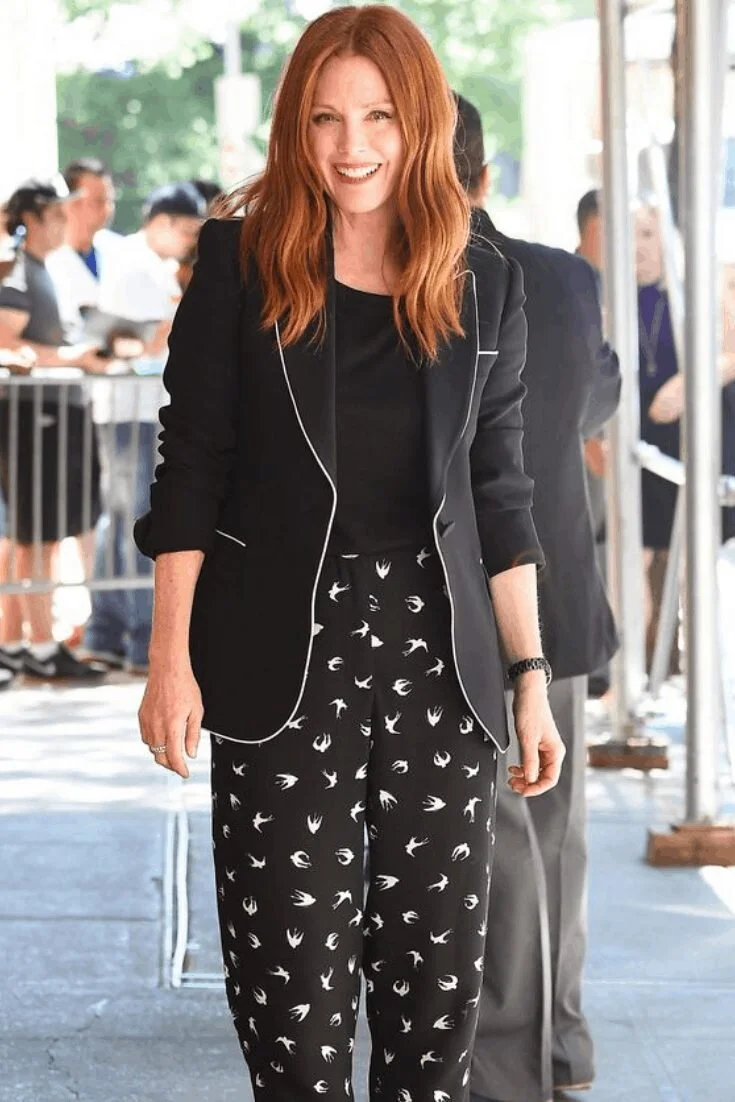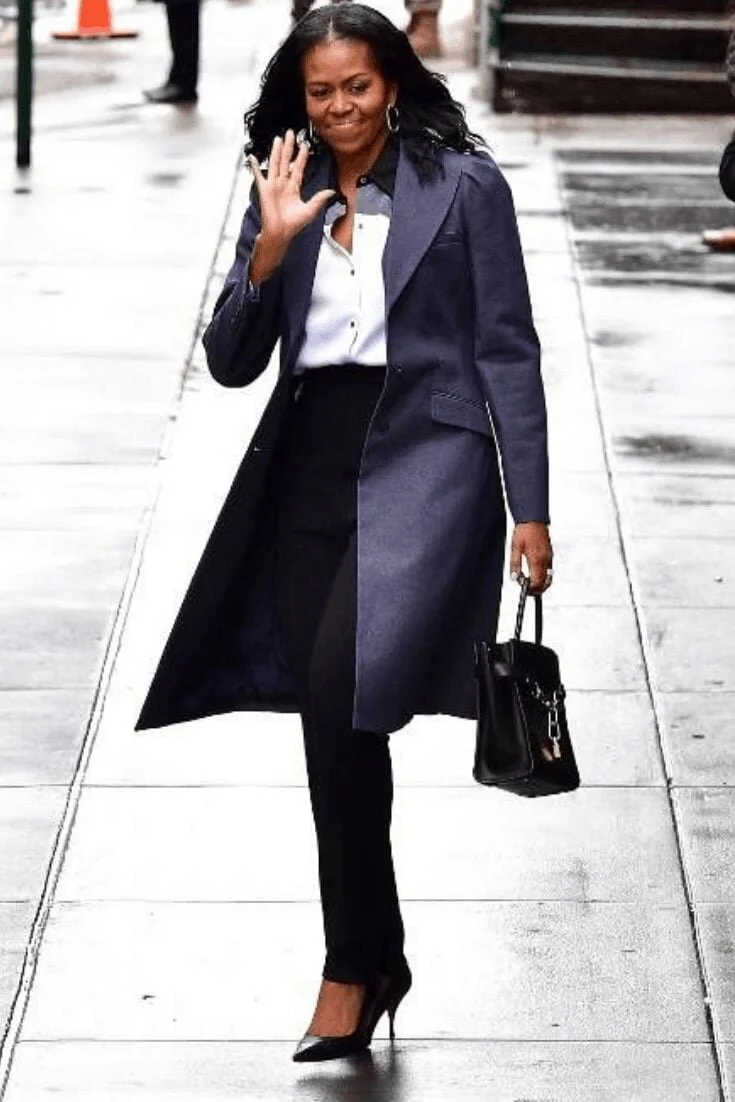Dressing For Menopause & Hot Flushes
This weeks weather had me thinking about the clients and family friends of mine currently experiencing one of the many fun things that come along with ageing as a woman. Menopause. Particularly, hot flushes in over 30 degree heat.
While ageing brings on new opportunities, I can only imagine how difficult it must be to go through menopause especially, when the experience varies for so many people. I’ve had clients breezing through it with very little symptoms and others struggling so hard with it that they’re constantly packing over night bags of extra clothing in their cars to change into because they’re sweating through their outfits.
Sadly, for many, menopause can be a real pain in the backside and a serious style curse. I’m here to lift some of that burden and cover some issues you might be facing when dressing for menopause; like fabric choice, clothing fit and how to layer properly so you still look chic and that sweat glistens like a gorgeous dewy finish foundation.
Now I must say – I’m not menopausal and haven’t yet experienced the joy of ‘change of life’ as some call it. But after Styling clients for this exact time in their life, for quite a long time, I’m happy to advise you that the next time you have a hot flush it will be a little less traumatic – style wise.
WHAT FABRIC SHOULD I WEAR DURING MENOPAUSE?
Clothes stick to you, your upper lip drips, your hairline gets stringy and you feel indecent stripping off suddenly in public to escape the heat. There are actually brands out there offering clothes for women going through menopause which is great, but like any market considered ‘niche’ (sing with me; maternity wear, plus size corporate wear, plus size bras, petite bra’s and quality women’s suiting), there is a hefty price to pay for these items that to me just doesn’t seem worth it - if you know your fabrics.
FABRICS TO KNOW ABOUT WHEN DRESSING FOR HOT FLUSHES
POLYESTER & COTTON BLEND: POLY-COTTON
The first thing I want to do is dispel a myth that all synthetics will drive you nuts during menopause. Many will, but there are a few lifesavers that won’t and will, in fact, be invaluable during your height of menopause. Poly-cotton has the breathability of cotton and the fast drying attributes of polyester, making hot flushes that are particularly sweaty, less visible.
HIGH-TECH NYLON or POLYESTER BLENDS –
A polyester or nylon blended fabric sounds like a terrible combination when you’re trying to keep the heat away but I want you to go have a look at your exercise clothing, particularly anything that says it’s moisture-wicking.
Both nylon and polyester blends can be great when dressing for menopause and hot flushes. Majority of exercise clothing is made from these blends and are called smart fabrics, because they not only wick-moisture away from your body to the outside of your fabric but they can keep you cooler. Most made-for-menopause clothing is made from high-tech nylon. So before you ditch all things nylon, take a closer look or give it a second chance.
COTTON
I love cotton, it’s a great fabric – natural, mostly lightweight, simple to care for and easy to find in stores. Like anything though, it has its downside, it doesn’t wick moisture away from your body, instead, it can cling to it. It feels great when doused in water and can have a lovely cooling effect but in some situations that isn’t always possible. I recommend cotton for colder months or worn as top layers like jackets and shirts open over singlets.
You’re best to buy cotton garments that won’t cling to your body, looser fit garments are a great idea for this fabric and if you’re after some fabric variations with the same qualities chambray and seersucker are fabulous.
LINEN
Linen is a beautiful breezy summer fabric that feels the closest to having nothing on. While it does crease, when worn in a blend of cotton and linen it won’t crease as much. Like cotton, it doesn’t wick moisture away, if you break a big sweat, linen will stick to your sweat but it won’t retain as many odours which makes it great for long days and even travel situations.
RAYON
Rayon is a fabric often confused as synthetic but it’s made from wood pulp which is a natural resource, it’s actually just been processed a lot which makes it a mix of both natural and synthetic properties. In the textile industry, it’s often referred to as semi-synthetic. Rayon is a cooling fabric to wear, often highly available in summer but it does crush – bummer. I know. But if you wear it in dark colours or longer styles the crushing becomes less obvious. A bonus perk is that it drapes beautifully, like silk – just without the price tag!
WOOL
If I had a dollar for every time I’ve been told by a client that they can’t wear wool because it’s too warm or because it’s scratchy I’d be wearing a pair of Jimmy Choo’s to put the bins out. Wool is a natural fabric and yes, some wools can be scratchy (particularly if they’re blended with acrylic). Some wools can be warm too, if you buy thick wool. The key to breathable wool is lightweight and loosely woven wool, I personally have strong feelings for Merino wool, because it will keep you cool and allow air to circulate around you. It doesn’t retain odours but we just have to be a little more careful when washing it. Avoid wool that has acrylic in it, as this will make you feel hot and scratchy.
AVOID SILK
Silk is a fabric I’m on the fence about when it comes to working for women struggling with menopause. It’s really lightweight and cool to wear but it does watermark, retains odour and is fragile. So while it would be great if you’re over menopause and looking for lightweight fabrics, it’s not the most practical fabric to wear during menopause, even though it’s natural.
LAYERING FOR MENOPAUSE
So if I could apply just two rules to layering, the first and most important is to make sure your layers end at different lengths. This doesn’t mean one or two centimetres difference between where your top ends and where your jacket ends, this means to have a substantial difference in length happening between layers.
An example of this working well would be to have on a pair of mid or high rise pants, worn with a top tucked in and a longer jacket or cardigan over the top. Another example would be to wear a dress with a cropped jacket. If your layers end around the same lengths on your body, where they do end, you’ll look wider. If the layers are all ending around your hip or thigh area, your legs will look shorter.
The second rule is to always add a third piece to your outfit. A necklace, a belt or even a linen scarf, loosely draped over your shoulders, can be a great third item that will add detail to your outfit so when you take your top layer off, you’re not feeling underdressed.
YOUR BODY IS CHANGING
When you’re going through menopause, you might notice a few changes in your shape. Your legs might be thinning out, you might notice you’re gaining more weight in your midsection than other areas that you might have before, your body is just going through another change, as it did through adolescence and childbirth. Sure, it can be frustrating when your shape changes because you got used to dressing it a certain way, now all your styling tricks feel like they’ve been thrown out the window – but there’s a fabulous silver lining, you get to wear things you used to find didn’t work for you.
Say hello to printed pants, more structured skirts and asymmetric dresses. Wrap dresses, A-Line and soft shirt dresses can be your friends, as can wide leg pants, flares and tapered cuts. You’ve got some new curves to dress for and you should take this as an opportunity to try something new and exciting!
But just a minute, before you run out the door with your savings card, let’s asses what you have first, starting with your intimates drawer. When was your last bra fitting? Has it been more than 12 months? Book yourself in for a bra fitting before you buy anything new because, with those new curves, you could be looking at a change in bra size.
How is menopause treating your closet? Is there anything you’re struggling with when it comes to clothing at this time in your life? Let me know in the comments below!




